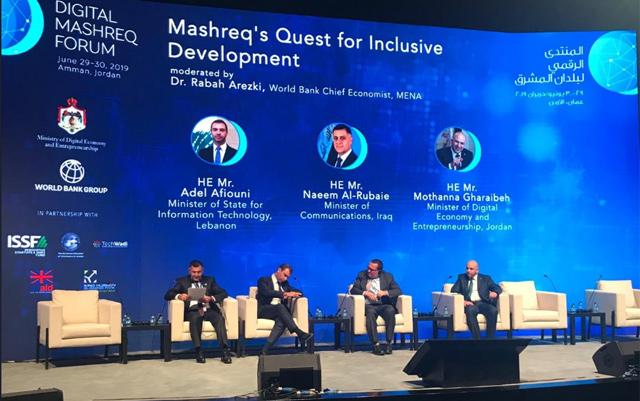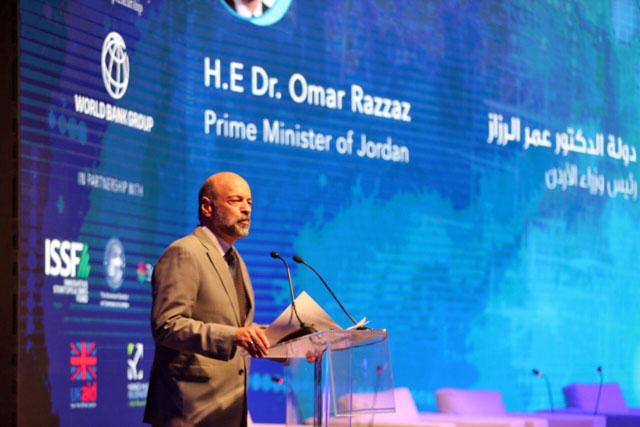You are here
Jordan committed to closing digital divide — PM
By Elizabeth Turnbull - Jun 30,2019 - Last updated at Jun 30,2019

Ministers from Jordan, Iraq and Lebanon during a panel discussion at the Digital Mashreq Forum in Amman on Saturday (Photo courtesy of World Bank MENA)
AMMAN — Prime Minister Omar Razzaz on Saturday underlined the importance of closing the digital divide, highlighting the government’s commitment to strengthening the digital economy, which is key to creating needed jobs.
Deputising for HRH Crown Prince Hussein, the Regent, at the Digital Mashreq Forum, which is the first such event in the region, the Premier said that Jordan's biggest challenge is empowering the youth and closing the digital divide, stressing that such improvement can only be carried out through digital disruption and improvement.
Held by the World Bank Group and the government, the two-day forum will bring together some 400 representatives from the public and private sectors of Jordan, Lebanon and Iraq, as well as executives from international and regional businesses, startups and investors to discuss the role of digitisation in shaping the region’s future from their perspectives.
Jordan is moving towards the Fourth Industrial Revolution, said Razzaz, highlighting the significance of focusing on the digital economy.
Speakers during the event emphasised the importance of the digital economy to address some of the pressing challenges in the region including creating jobs, especially since there will be 30 million university graduates in the Middle East and North Africa by 2020, and 140 million jobs will be needed by 2020.
While the global economy used to be defined by a supply of natural resources, Razzaz stressed that Jordan is equipped to compete globally, despite being a smaller country, as it does not need natural resources but human resources and talent which it already possesses.
Jordan has a comparative advantage in Ed Tech, Fin Tech and Health Tech which are well developed and comparable to technology around the world, according to Razzaz.
“We commit to a path toward deepening, strengthening and widening the digital economy,” said Razzaz, voicing his keenness to make it easier and less costly for startups to begin business.
Minister of Digital Economy and Entrepreneurship Muthanna Gharaibeh said that digitisation serves as one of the main ways of assuring jobs and good quality of living for the Jordanian people.
For his part, Ferid Belhaj, World Bank Group Vice President for Middle East and North Africa, stressed during the inauguration session of the forum that the bank seeks to generate 500,000 jobs in the coming years through cooperation with the regional governments.
Belhaj also highlighted the importance of the role of the private sector for being the driver of digital development.
He noted that regional youth are educated and open to the world, yet education and knowledge have to be associated with the labour market, where the job system has to be connected with this transformation, adding that: “Today’s jobs may not be needed tomorrow”.
He stressed that MENA has a “wonderful opportunity”, noting that the forum will be held next year in Lebanon and the year after in Iraq, which highlights the forum’s continuous efforts to promote envisioned change.
Gharaibeh said that business entrepreneurship in Jordan, whose population is 3 per cent of the region’s total, accounts for 23 per cent of the business entrepreneurship in the Arab region.
Figures also show that the Kingdom has advanced seven ranks on the global business entrepreneurship index to the 49th place, and that Jordan moved from the 70th to the 50th place on the International Talent Competition in only three years, the minister noted.
Gharaibeh said that technology and software exports have been granted tax exemptions, where companies investing in the ICT sector in the local market have also been given similar exceptions to stimulate the sector and attract more investments, adding that Jordan seeks to reach 100 per cent Internet penetration to support the use of e-services and e-payments.
As part of efforts to support programming, the minister said that the One Million Arab Coders programme has been launched in partnership with the UAE, where, in conjunction, the ministry launched training programmes that target ICT graduates for modern programming skills.
Iraqi Deputy Prime Minister for Economic Affairs and Minister of Finance and Planning Fuad Hussein stressed that the digital economy and business entrepreneurship constitute an opportunity and a solid base to rebuild Iraq, noting that his country will be digitally connected to the world and technology will play an important role in the reconstruction.
The minister also voiced Iraq’s commitment to drawing an organisational and political framework for e-payments and presenting electronic government services with the highest level of cyber security.
Lebanese Minister of State for Information Technology and Investment Adel Afiouni said that Arab Mashraq, (eastern Arab region), countries need to improve their competitiveness and sign joint agreements, noting that Arab countries can create a “significant economic bloc”.
He voiced his belief that technology and the knowledge economy form “the lifeline and haven” for the youth to utilise these developments.
The conference’s agenda will focus on trends in digital economy in the Middle East and North Africa, factors for achieving Mashreq’s digital economy development targets and the potential role global technology companies could play in supporting governments’ development plans.
Discussions will also cover means to better position the region as a favourable destination for global technology companies, to provide technical support and development services to regional and global markets.
Related Articles
AMMAN — The Amman-hosted Digital Mashreq Forum, a high-level conference on Digital Economy and Entrepreneurship Development in Mashreq count
AMMAN — Start-ups will be exempted from capital tax starting this year, Minister of Digital Economy and Entrepreneurship Muthana Gharaibeh a
AMMAN — The government is working on amendments to the Social Security Law and the law pertaining to public-private partnerships aiming to c













